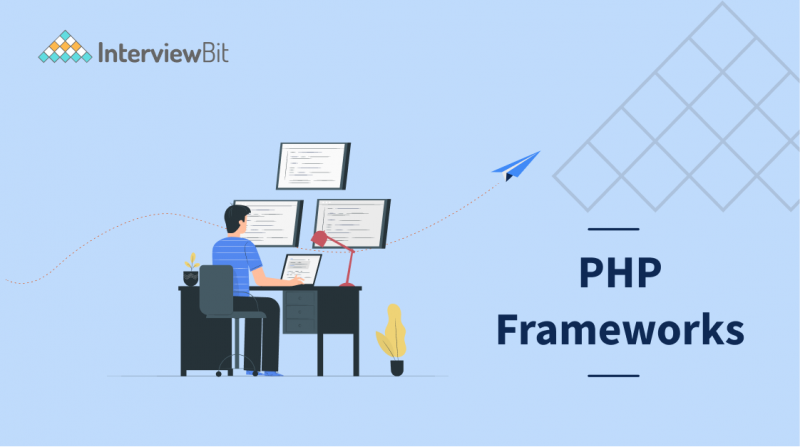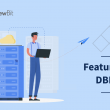- Introduction
- What is PHP Framework?
- Why Use PHP Framework?
- 10 Best PHP Frameworks
- 1. Laravel
- 2. Codeigniter
- 3. Symfony
- 4. Laminas Project
- 5. Phalcon
- 6. CakePHP
- 7. Yii
- 8. Zend Framework
- 9. FuelPHP
- 10. PHPPixie
- Conclusion
- FAQs
- Q1: Which PHP framework is the fastest?
- Q2: Is WordPress a PHP framework?
- Q3: Is Javascript similar to PHP?
- Q4: What can replace PHP?
- Additional Resources
Introduction
PHP is now a widely used web development technology, accounting for a majority of websites on the internet. However, the developer community has mixed feelings about this technology. Some developers consider it the best technology for developing a wide range of web solutions, while others consider it mediocre, outdated, and crappy.
There is currently a large ecosystem of frameworks available to make developing PHP code simpler. But why are you using a PHP framework in the first place? What’s more, how can you determine which PHP framework is best for your needs?
This article will cover the top 10 PHP frameworks available today and offer you the knowledge you need to decide which one is perfect for you.
Confused about your next job?
What is PHP Framework?
PHP framework is a framework that allows you to create PHP web applications. It usually includes libraries with pre-packaged methods and classes, as well as parts for implementing software design patterns. In addition, the language is not restricted to HTML and may create and export a variety of text and graphic files.
Aside from that, PHP supports a large number of databases, which simplifies the web construction process. PHP provides developers, designers, and employers with a lot of freedom of choice and creativity because of its versatility.
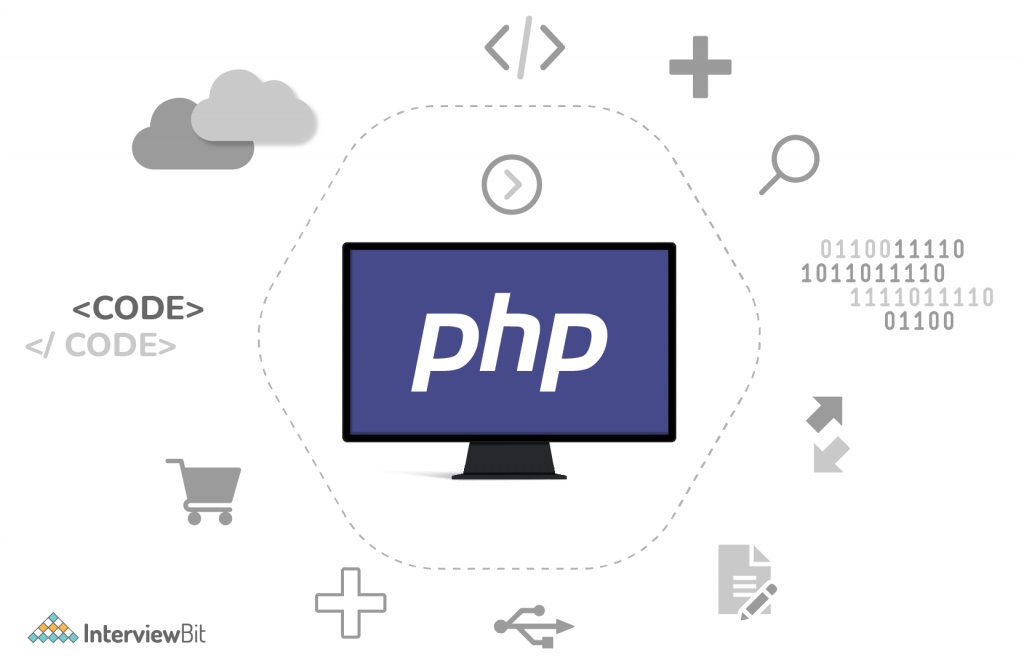
Why Use PHP Framework?
There are several advantages to utilizing PHP frameworks rather than writing code from scratch.
- More Rapid Development: Because PHP frameworks provide built-in libraries and tools, development time is reduced. The CakePHP framework, for example, has the Bake command-line tool, which may instantly generate any skeleton code you want for your application. The PHPUnit library is included in several popular PHP frameworks for simple testing.
- Less Code to Write: You won’t have to create as much original code if you use the framework’s built-in functionalities.
- Task-Related Libraries: Many of the things that web app developers will have to do are standard. Form validation, data sanitization, and CRUD operations are just a few examples (Create, Read, Update, and Delete). So instead of writing your functions for these tasks, you may just utilize the ones included in the framework.
- Use Proper Coding Techniques: The majority of PHP frameworks adhere to coding best practices. The partition code, for example, into several folders based on function. They push you to structure your code in a more logical, tidy, and maintainable manner. Entity name standards are also defined by frameworks, which you should follow.
- It’s Safer Than Developing Your Application: Cross-site scripting, SQL injection attacks, and cross-site petition forgery are just a few of the PHP security risks. Your PHP web applications will be susceptible unless you take the proper precautions to safeguard your code. Using a PHP framework does not replace developing safe code, but it does reduce the risk of hacker attacks. Data sanitization and protection against the common dangers outlined above are built-in to good frameworks.
10 Best PHP Frameworks
We’ve gathered a list of the top 10 PHP frameworks for web development. They’re all diverse and cater to various demands, so make sure you choose the proper one for your project.
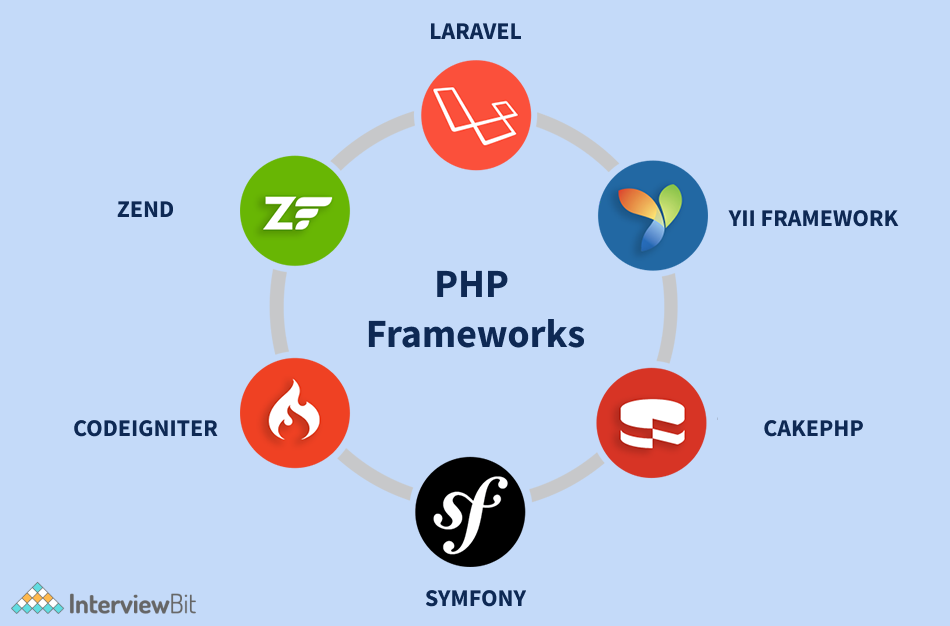
1. Laravel
Laravel is a well-known PHP framework that is noted for its free, open-source PHP framework. It has many features and functionalities built-in, making it a good tool for customizing complicated projects. User authentication, session management, and caching are among its features.
There are other packages that you may use to augment the framework. For example, framework-independent packages operate with all PHP frameworks, but Laravel-specific packages only work with Laravel. The Laravel Debugbar, for example, is a popular package that adds a toolbar to the application that is beneficial throughout the debugging process.
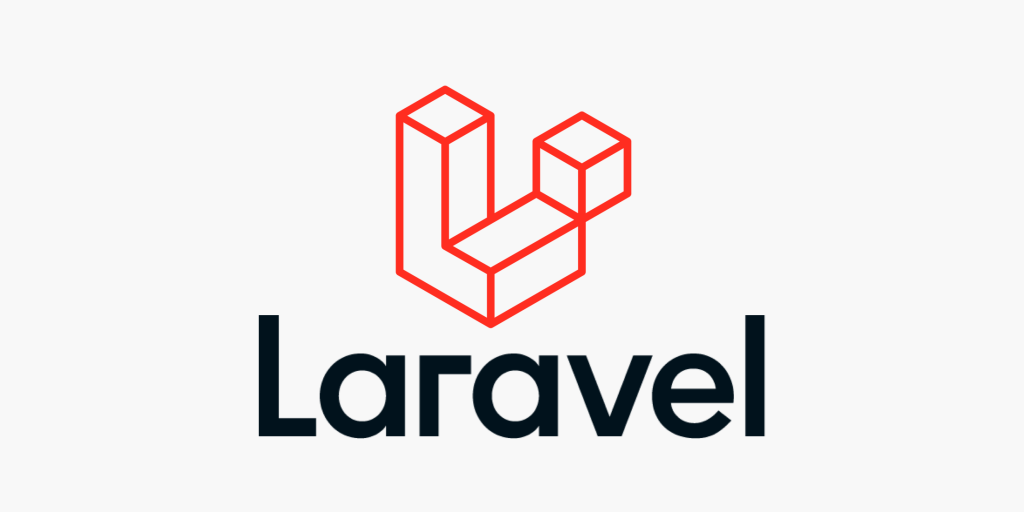
Key Features:
- Laravel is a good choice for small and big projects with sophisticated backend needs. The arrival of Homestead, a preconfigured, all-in-one vagrant machine, has made installing Laravel simpler.
- It’s a PHP framework with a lot of options for customising complicated programmes. These include, among other things, seamless data transfer, MVC (Model, View & Controller) architectural support, security, routing, view template engine, and authentication.
- Laravel is a very expressive framework, and its performance and security meet current online application standards. Laravel is the way to go for developers who want to construct B2B or corporate websites that will adapt to new web trends.
One of the most renowned examples is the BBC, the world’s oldest broadcasting institution and the biggest broadcaster by personnel count. In addition, 9GAG, Pfizer, TourRadar, and Crowdcube are just a handful of the notable names that use Laravel.
2. Codeigniter
CodeIgniter is a lightweight PHP framework designed for developers who require a simple and beautiful toolset to build full-featured web applications. It is a small PHP framework that takes up less than 1.2 MB of disc space. As a result, it assures quicker page loads and has a minimal impact on your web server and apps.
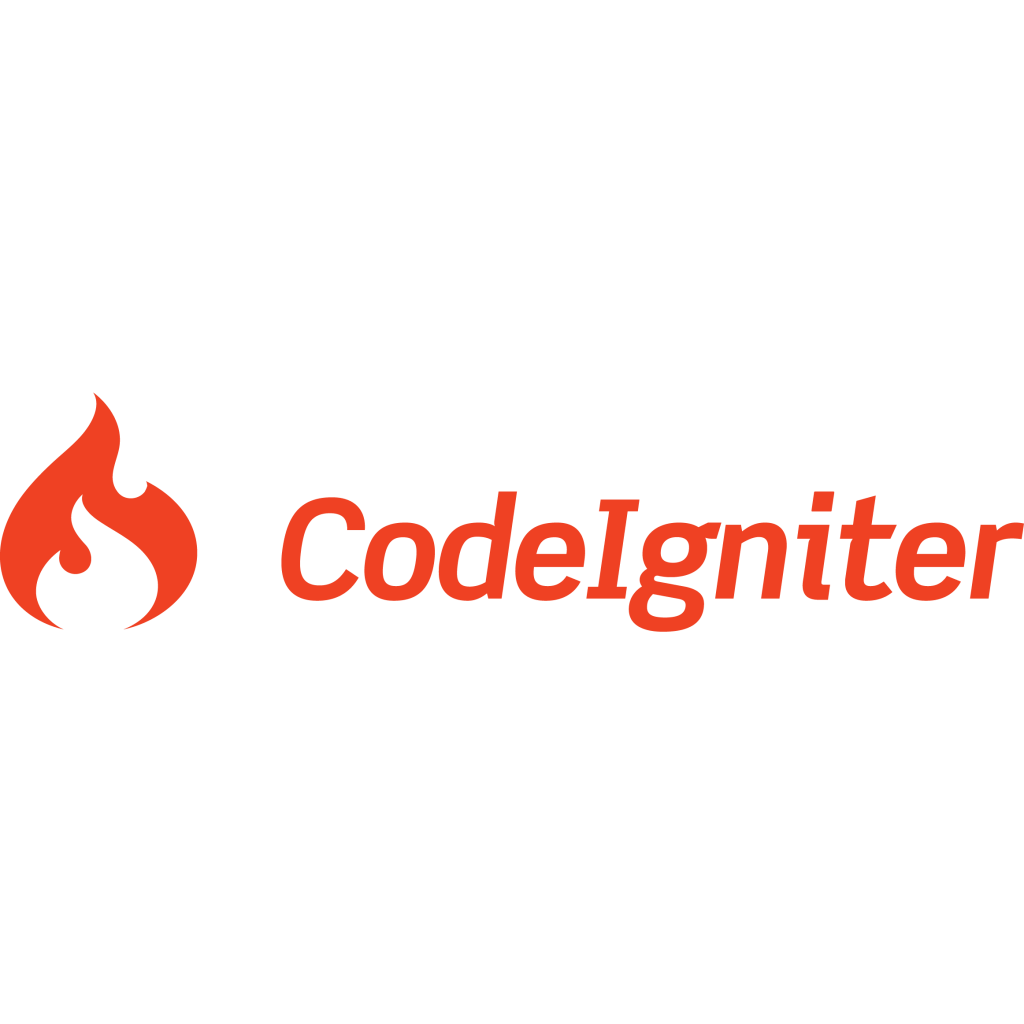
Key Features:
- Unlike other frameworks, CodeIgniter is a lightweight and simple PHP framework. Its ease of use and well-illustrated instructions make it excellent for newcomers.
- MVC design, great error handling, security tools, and easy and excellent documentation are highlights. It also makes scalable applications.
- CodeIgniter is speedier than competing frameworks. Its solid performance makes it a viable option for developing lightweight apps for small servers.
Udemy, Medical Guardian, QuinStreet, and Abode are just a handful of the firms that use Codeigniter.
3. Symfony
The Symfony framework was first released in 2005, and despite having been around much longer than the other frameworks on our list, it is a solid and mature platform. Symfony is a modular component-based PHP framework with a lot of flexibility. In addition, Symfony makes use of Twig, a fast template engine with a simple syntax. Finally, its built-in debugging tool ensures that your project runs smoothly.

Key Features:
- Symfony is the ideal framework for building large-scale corporate applications. On most systems, it’s simple to set up and configure.
- It’s PHP components that may be reused. It’s also database engine independent, reliable, follows most web best practices and design principles, and can be integrated with other vendor libraries.
- It offers a flexible and robust debugging toolbar that displays all of the necessary information to make debugging simple.
- Symfony deployment is a snap since there’s no need to invest time or effort on manual deployment or developing an automated deployment solution.
OpenSky, a social shopping platform, the massively multiplayer online browser game eRepublik, and the content management system eZ Publish in version 5, employ the Symfony framework. In addition, Symfony components have been used in Drupal 8, phpBB, and many other significant projects.
4. Laminas Project
Laminas is the successor of Zend’s PHP framework. Because of its component-based design, Laminas Projects is often referred to as a glue framework. The PHP framework from Laminas is an object-oriented, MVC-based framework that allows you to load just the components you need as separate libraries. Furthermore, the components and MVC- framework adhere to corporate development principles, making them appropriate for sophisticated web applications.
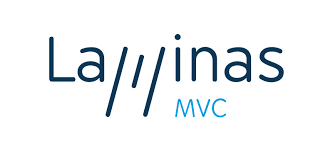
Key Features:
- Integration of external libraries with MVC architecture
- Allows you to use just the parts you need.
- Architecture that may be used at any time, with loosely linked components and few interdependencies
- The flexible caching subsystem works with a variety of backends, including memory and a file system.
5. Phalcon
Because its development style is based on C and C++, Phalcon stands out among other PHP frameworks. It does, however, come with extensive development options that allow you to design faultless web apps. Asset management, caching, a universal autoloader, and other capabilities are included in the framework. Phalcon is simple to use and comprehend, and it comes with extensive documentation to assist developers in better understanding the PHP framework.
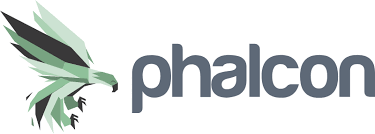
Key Features:
- Phalcon is simple to set up and use, and it’s ideal for building highly flexible web applications that follow corporate development rules.
- Increased execution speed, asset management, a universal autoloader, and top security and caching are just a few of the highlights.
- Phalcon, unlike other frameworks, enhances speed by making optimal use of memory. Give Phalcon a go if you want to build a lightning-fast website.
Proshore, Urban Sports Club, and Edureka are among the 34 organizations to employ Phalcon in their IT stacks.
6. CakePHP
Look no further if you’re seeking a simple and beautiful toolbox. CakePHP can assist you in creating aesthetically appealing, feature-rich websites. CakePHP is also one of the most simple frameworks to learn, thanks to its CRUD (create, read, update, and delete) structure. CakePHP first appeared on the scene in the early 2000s, and since then it has improved performance and added a slew of new features. CakePHP features an extensive library with one of the most comprehensive collections of useful components. If you need to incorporate difficult-to-find functionality, this is an excellent alternative.
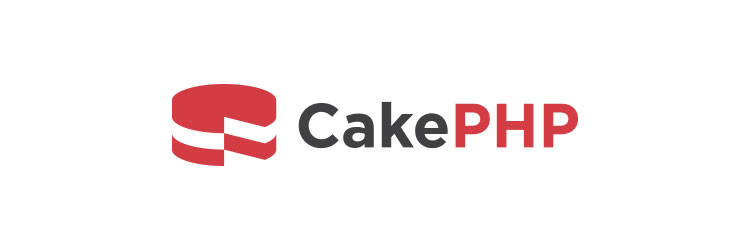
Key Features:
- CakePHP is simple and straightforward to set up, requiring simply a web server and a copy of the framework.
- SQL injection prevention, input validation, cross-site request forgery (CSRF) protection, and cross-site scripting (XSS) protection are among the security features that make it an excellent option for business applications.
- A contemporary framework, quick builds, appropriate class inheritance, validation, and security are just a few of the main features. CakePHP also offers excellent documentation, a plethora of help sites, and premium assistance via Cake Development Corporation.
CakePHP is most often used in the United States and the Hospital & Health Care business. In addition, CakePHP is most often utilized by companies with 10-50 workers and revenue of $1 million to $10 million. A few such companies are Turner & Townsend plc, InSync Solutions, Glen Raven, Inc., and Citizens Inc.
7. Yii
Yes, it is! is the name of the Yii framework, which is simple and evolutionary. It’s a component-based PHP framework for building contemporary online apps with good speed. Yii is ideal for a wide range of online applications. As a result, it’s considered a universal web programming framework.

Key Features:
- Yii is simple to set up. Its extensive security features make it suited for highly secure applications like e-commerce, portals, CMS, forums, etc.
- It’s fast, adaptable, and enables developers to avoid writing repeated SQL queries by modelling database data as objects.
- Yii is developed by a core developer team and specialists. You may submit difficulties on Yii forums and receive support from a large community.
- Yii is very flexible, allowing you to modify practically every line of code. If it’s your first time, expect a high learning curve.
Yii is supposedly used by 288 firms, including General Electric, Deloitte, and the Evergreens Team stack.
8. Zend Framework
The Zend framework is a fully object-oriented framework that may be extended thanks to features like interfaces and inheritance. It was created using the agile process, which enables you to offer high-quality apps to business customers. Zend is extremely flexible and follows PHP standard practices, which is critical for developers looking to add project-specific features.

Key Features:
- For sophisticated, enterprise-level applications, the Zend framework is a good choice. It’s the framework of choice for huge IT departments and financial institutions.
- MVC components, a simple cloud API, data encryption, and session management are just a few of the main features.
- It can work with external libraries and you may pick and choose whatever components you wish to employ. The Zend framework provides extensive documentation and a huge user community. If you’re a mobile app developer, though, be prepared for a steep learning curve.
With 433 websites, China is the most popular for the Zend framework, followed by the United States (332 websites), Japan (97 websites), Brazil (63 websites), Germany (38 websites), and so on.
9. FuelPHP
FuelPHP is a full-featured PHP framework that was initially published in 2011. It is a PHP MVC framework for constructing apps that is extremely flexible and adaptable. The framework supports Hierarchical Model-View-Controller (HMVC), an advanced form of MVC, in addition to MVC. Unlike MVC, HMVC does not need duplicate content to display on several pages. As a consequence, it takes up less time and requires less memory.

Key Features:
- FuelPHP enables developers to create end-to-end web applications of varying sizes and complexity.
- HMVC implementation, RESTful implementation, a URL routing system, vulnerability prevention, and a caching mechanism are all key aspects.
- Its security strategy goes beyond standard security procedures, making it an excellent choice if your project’s security is critical. FuelPHP is a newer framework that provides less support and may have a higher learning curve.
FuelPHP is most often used by enterprises in the United States and in the Computer Software sector.
10. PHPPixie
PHPixie is a fully optimized full-stack PHP framework for building high-performance online applications. It, like FuelPHP, provides a Hierarchical Model-View-Controller (HMVC) and is made up of separate components. The framework also has an active community that contributes to the framework’s different improvements on a regular basis.

Key Features:
- If you are seeking a framework that is simple to learn and implement, look no further.
- It is compatible with the enhanced HMVC architecture.
- The routing scheme is rather impressive.
- Framework with MongoDB support that is lightweight.
Conclusion
Using PHP frameworks makes the development process easier, which reduces workload. Each framework has its own set of advantages and disadvantages, as well as differences in terms of community, documentation, and database support.
As a result, the optimal framework to utilize is determined by a variety of variables, including security, simplicity of use, scalability, documentation, and more. As a result, begin by learning about the requirements of the project or application you wish to create. Then, from this selection, choose the PHP framework that best suits your needs. You can’t go wrong with this.
FAQs
Q1: Which PHP framework is the fastest?
Ans: CodeIgniter is known for being the quickest PHP framework for web development. CodeIgniter is also the finest PHP framework for web applications that rely on data management. It’s simple to generate, insert, update, and remove coding statements using CodeIgniter instead of writing raw SQL.
Q2: Is WordPress a PHP framework?
Ans: In a nutshell, WordPress may be described as a PHP framework. This is due to the fact that WordPress offers a variety of APIs on which you may base your application.
Q3: Is Javascript similar to PHP?
Ans: It’s unfair to compare PHP with JavaScript since they’re used for distinct reasons in web development. JavaScript is a client-side scripting language, whereas PHP is a server-side scripting language. In reality, the most dynamic website is developed when both languages’ features are combined. If PHP is a paintbrush for painting a picture, JavaScript is the colour.
Q4: What can replace PHP?
Ans: The Three Most Effective PHP Alternatives are:
- Python
- Java
- Go


